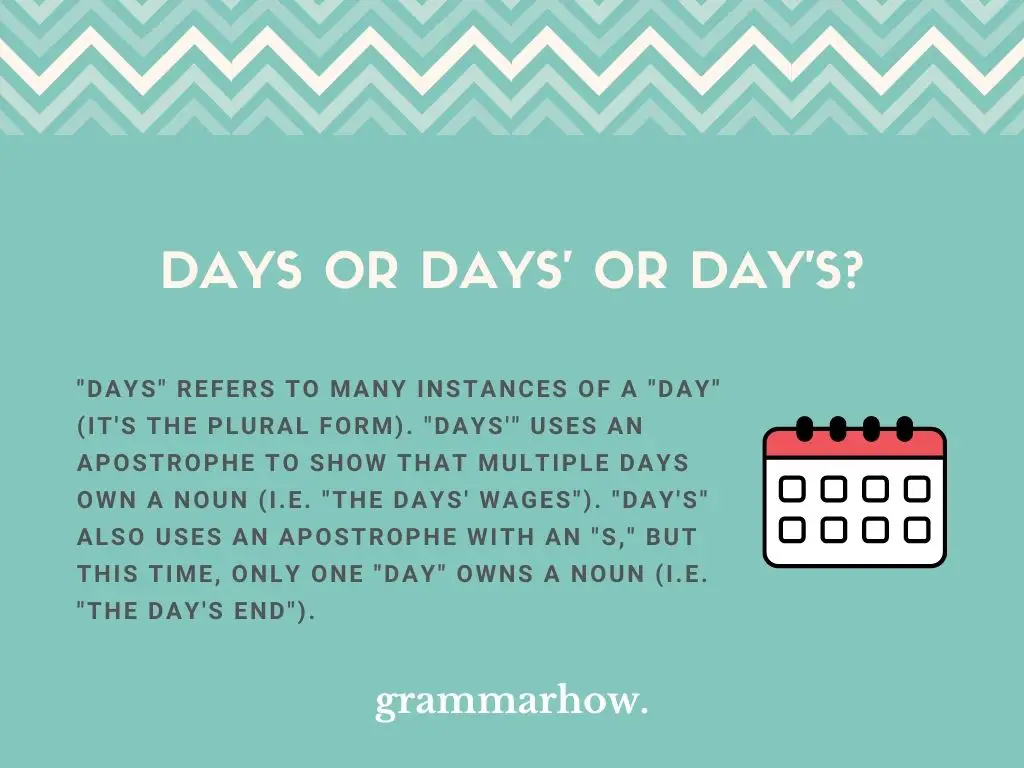“Day” as a noun can own an object, thus allowing it to have a possessive form. If you’re curious about the possessive form rules, you’ve come to the right place. We’ll explain how “days,” “days’,” and “day’s” work in different situations.
Days or Days’ or Day’s?
“Days” refers to many instances of a “day” (it’s the plural form). “Days'” uses an apostrophe to show that multiple days own a noun (i.e. “the days’ wages”). “Day’s” also uses an apostrophe with an “s,” but this time, only one “day” owns a noun (i.e. “the day’s end”).

“Day” comes with the following grammatical forms:
| Singular | Day |
| Plural | Days |
| Singular possessive | Day’s |
| Plural possessive | Days’ |
Grammar rules are fairly simple when working with regular nouns. You can stick to the same rules throughout your writing to help establish the singular and plural possessive forms.
The singular forms “day” and “day’s” work together. You need to add an “‘s” to the end of “day” to show that one day owns a noun.
The plural forms “days” and “days'” also work together. This time, “days'” only has an apostrophe at the end of it. This is done to avoid adding an extra “s” (creating “days’s”) as this would appear jarring to most readers.
Day’s
One day can own an object as well. “Day’s” is used when this is the case, as it’s the singular possessive form. You should include an apostrophe and an “s” after “day” to highlight this form.
You will almost always find the object after “day’s,” just like with the plural possessive form. This is done to help readers understand where the ownership comes from.
- You’ll have to talk with her at the day’s end. For now, you can sit around and have a drink.
- I’ll need one day’s notice before I can do anything. I’m so sorry to mess you around.
Days’
“Days'” comes from the plural form, but you can use it as a possessive noun. It shows that several days own a similar item or noun. The noun that “days'” own will always come after the possessive form to show the reader what the “days” own.
- I need many days’ notice before I can decide whether this is going to work for me.
- How many days’ schedules have you messed up? We need to figure out a better way to do this.
When using “days'” in the plural possessive form, the noun always comes after “days’.” The apostrophe shows ownership, and the noun directly after it helps the reader see what is owned.
Days
“Days” is plural. You should use it when talking about several days in the same sentence. Standard grammar rules teach us that an “s” is all that’s required when turning the singular form into the plural form.
This makes sense for “day” and “days.” “Day” refers to one day. “Days” refers to multiple.
- My days have gotten a lot longer later. I don’t know if it’s worth my time.
- What about doing it on different days? Have you ever thought that might be wise?
Conclusion
“Days,” “days’,” and “day’s” all come with different properties and purposes.
“Days” is plural. Several days come up in the context when using this form. No possession is allowed, though.
For possession, you can use “days’.” It’s the plural possessive form, showing several days owning an item.
You may also possess an item with “day’s.” This is the singular possessive form, showing one day owns an item.

Martin holds a Master’s degree in Finance and International Business. He has six years of experience in professional communication with clients, executives, and colleagues. Furthermore, he has teaching experience from Aarhus University. Martin has been featured as an expert in communication and teaching on Forbes and Shopify. Read more about Martin here.
